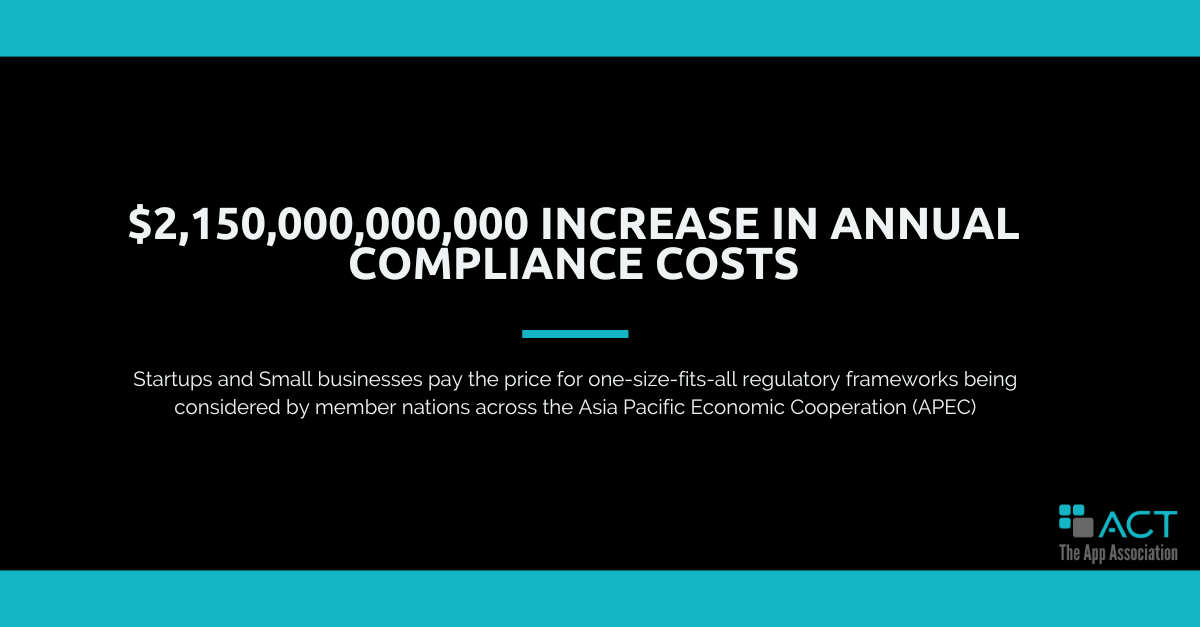In the Asia-Pacific Economic Cooperation (APEC) region, aggressive anti-competition policies to regulate online marketplaces will crush small businesses and cost consumers. Two recent research reports expose the significant increases in regulatory costs and the even greater economic loss for APEC member economies and international trading partners. Micro, small, and medium-sized enterprises (MSMEs), like ACT | The App Association’s members, will feel the impact of digital platform regulations the most, so we are engaging with policymakers across APEC to ensure that policy changes support small business and startup growth and job creation.
As a leading example, drastic regulatory changes being pushed by Korean policymakers, including the proposed Fairness in Online Brokerage Transaction Act, the Online Platform Monopoly Act (PMA), coupled with ongoing disproportionate competition law enforcement by the Korea Fair Trade Commission (KFTC), could trigger a combined $1 trillion in economic losses for the Korean and U.S economies over the next 10 years. New research by the Competere Foundation, a non-profit foundation focused on educating policymakers about non-tariff barriers impacting national economies, shows Korea would shoulder an estimated $469 billion in losses.
These findings reinforce further empirical data and recommendations recently released by the Southeast Asia Public Policy Institute (SEAPPI) in a new policy white paper, Digital Platform Regulation in APEC Economies. The study shows that these types of prescriptive, compliance-heavy regimes in digital markets across the APEC region would impose an estimated $3.07 billion in annual compliance costs.
Unintended Consequences
SEAPPI’s groundbreaking study modeled the potential annual compliance costs that result from the imposition of overly-broad ex ante conduct rules in developing digital markets across nine APEC economies, focusing on e-commerce, digital advertising, and app distribution. The findings are stark:
- MSMEs Pay the Price: An astonishing 70 percent of the $3.07 billion annual compliance burdens, or approximately $2.15 billion, would fall directly onto MSMEs.
- Korean Burden: In Korea specifically, MSMEs would shoulder an estimated $512 million of the total annual compliance costs.
While larger firms may be able to absorb the resource burdens brought on by new ex ante digital platform regulations, startups and MSMEs will face tightened or cost-prohibitive margins, delayed research and development cycles, and slower growth. Any of these alone can spell death for an MSME. And because MSMEs account for over 98 percent of enterprises across the APEC region, it is vital that economies across APEC recognize the threat these new regulatory interventions pose to their competitiveness writ large.
Digital platforms and the bundle of services they provide are critical to MSMEs’ ability to scale and compete, so it is vital that government interventions into these markets are based on demonstrated harms. The results of the study illustrate that policymakers must ensure any government action is developed deliberately and implemented thoughtfully to avoid disrupting this procompetitive dynamic. It also illustrates the App Association’s position that proportionate and pro-growth frameworks that preserve platform dynamics correlating to so much small developer growth and job creation are the advisable path forward for policymakers. As a corollary, the results show how fragmentation across APEC member economies stunts domestic small business growth. Unsurprisingly, Europe’s lived experiment with DMA tracks closely with the study’s cost estimates. Any objective observation of the DMA’s rollout and impact in the EU will reinforce that overly broad ex ante digital platform rules stifle innovation, raise costs, and entrench incumbents, ultimately leaving startups and MSMEs in the dust and damaging an entire economy’s competitiveness.
As the SEAPPI report concludes, “Roughly 70 percent of the compliance burden would fall on small to mid-sized enterprises, underscoring the need for rules that protect, not penalize, the innovators they aim to serve.” Policymakers across APEC have a critical opportunity to learn from the implementation of digital platform regulations already in place in the EU and from estimates like SEAPPI’s. To keep digital markets healthy and competitive, APEC member economies should base competition enforcement on the consumer welfare standard. Policymakers should focus on outcomes that benefit consumers, such as expanding market access, reducing marketing costs, and encouraging innovation, rather than concentrating on market size. This approach will help sustain growth and preserve opportunities for startups, scaleups, and MSMEs across the region. We hope policymakers can learn from this evidence and adopt a policy approach that strengthens, rather than fragments, the digital ecosystem that drives innovation and opportunity throughout the region.
